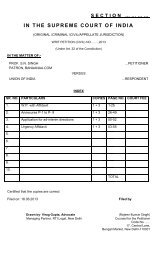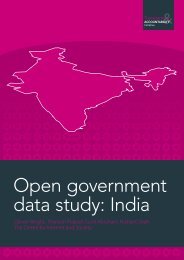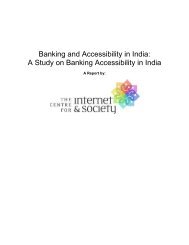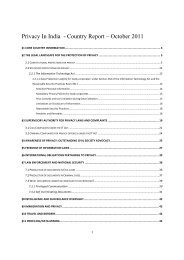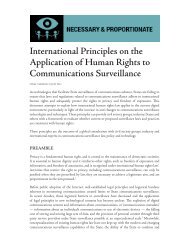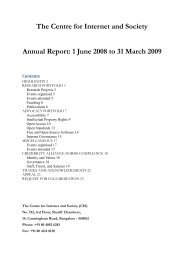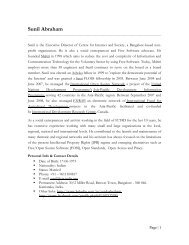Open Access to Scholarly Literature in India - Centre for Internet and ...
Open Access to Scholarly Literature in India - Centre for Internet and ...
Open Access to Scholarly Literature in India - Centre for Internet and ...
Create successful ePaper yourself
Turn your PDF publications into a flip-book with our unique Google optimized e-Paper software.
<strong>Open</strong> access's value <strong>to</strong> the develop<strong>in</strong>g countries is likely <strong>to</strong> <strong>in</strong>crease manifold as the<br />
penetration of the relatively cheaper mobile telephones <strong>in</strong> the poorer countries of the<br />
world <strong>in</strong>creases at a much faster pace than the more expensive personal computers <strong>and</strong><br />
lap<strong>to</strong>ps. And the mobile phones are becom<strong>in</strong>g smarter. More researchers will have access<br />
<strong>to</strong> <strong>Internet</strong> <strong>and</strong> hence open access material.<br />
<strong>Open</strong> access can benefit the lay public as well. Why the public should care <strong>for</strong> what is<br />
published <strong>in</strong> the rarefied areas of scientific knowledge, one may ask. To anyone who is<br />
follow<strong>in</strong>g the debates on climate change, genetically modified crops <strong>and</strong> generic drugs it<br />
would be clear that these debates are as much cultural, social <strong>and</strong> political as they are scientific.<br />
In particular, as Prof. Andrew Hoffmann of MIT po<strong>in</strong>ts out <strong>in</strong> a recent <strong>in</strong>terview<br />
<strong>to</strong> the New York Times, the position people take on these issues is largely political <strong>and</strong><br />
based on the values <strong>and</strong> beliefs they hold. That is why it is all the more important <strong>in</strong> a<br />
world which is gett<strong>in</strong>g more <strong>and</strong> more complex <strong>to</strong> promote the public underst<strong>and</strong><strong>in</strong>g of<br />
science, <strong>and</strong> what better way than mak<strong>in</strong>g all science open <strong>and</strong> freely accessible <strong>to</strong> all.<br />
Added <strong>to</strong> that, there are <strong>in</strong>itiatives now which take the common citizens as partners <strong>in</strong><br />
per<strong>for</strong>m<strong>in</strong>g science. For example, the E<strong>in</strong>ste<strong>in</strong>@Home project 37 discovered a radio-pulsar<br />
<strong>and</strong> the LHC@Home project 38 enables volunteers <strong>to</strong> contribute idle time on their computer<br />
<strong>to</strong> help physicists develop <strong>and</strong> exploit particle accelera<strong>to</strong>rs, such as CERN's Large<br />
Hadron Collider. A number of amateur astronomers now use sophisticated telescopes attached<br />
with smart phones <strong>to</strong> look at the night sky <strong>and</strong> identify new planets.<br />
“I th<strong>in</strong>k that the whole arena of medical research publication <strong>and</strong> report<strong>in</strong>g needs a<br />
shake up <strong>and</strong> needs <strong>to</strong> be h<strong>and</strong>led <strong>in</strong> a different way. I th<strong>in</strong>k that we could be eons ahead<br />
of where we are <strong>to</strong>day if we had a very different system <strong>for</strong> shar<strong>in</strong>g results,” says Sharon<br />
Terry of Genetic Alliance, a patient advocacy group. 39<br />
Serials crisis<br />
It is not only <strong>in</strong>stitutions <strong>in</strong> develop<strong>in</strong>g countries which f<strong>in</strong>d it hard <strong>to</strong> access research<br />
<strong>in</strong><strong>for</strong>mation. Librarians <strong>in</strong> affluent universities <strong>in</strong> North America are fac<strong>in</strong>g a crisis <strong>to</strong>o.<br />
As publishers are accountable <strong>to</strong> their shareholders more than <strong>to</strong> scientists who publish <strong>in</strong><br />
<strong>and</strong> read their journals <strong>and</strong> librarians who subscribe <strong>to</strong> them, their ma<strong>in</strong> motive is profit<br />
rather than provid<strong>in</strong>g scientists af<strong>for</strong>dable access <strong>to</strong> <strong>in</strong><strong>for</strong>mation. Publishers' greed led <strong>to</strong><br />
a spirall<strong>in</strong>g rise <strong>in</strong> the subscription price of journals, especially <strong>in</strong> the past three decades,<br />
with journal subscription costs ris<strong>in</strong>g at many times the general <strong>in</strong>flation. Accord<strong>in</strong>g <strong>to</strong><br />
the Association of Research Libraries (ARL), the median subscription cost of a journal<br />
rose from $87 <strong>in</strong> 1986 <strong>to</strong> $267 <strong>in</strong> 1999 at an alarm<strong>in</strong>g 9 per cent annual growth rate. In<br />
1986, research libraries <strong>in</strong> North America purchased on average 16,312 serial titles <strong>and</strong><br />
37 E<strong>in</strong>ste<strong>in</strong>@Home.org<br />
38 http://lhcathome.cern.ch/.<br />
39 http://www.biomedcentral.com/openaccess/archive/?page=features&issue=21.<br />
Page | 19




